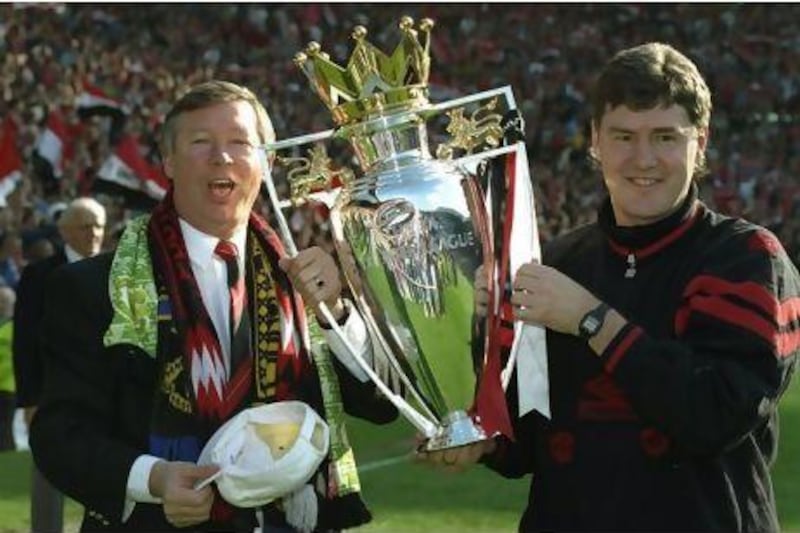The Manchester United which Sir Alex Ferguson is leaving is unrecognisable from the club he joined 26-and-a-half years ago.
United then were closer to relegation than the top of the table.
They had been defeated in the league by Charlton Athletic, Watford and held by Coventry City. Ferguson's first game was at Oxford United's ramshackle Manor Ground, where just 13,545 showed up to see them lose 2-0.
The former United striker Frank Stapleton said: "He changed the whole way the club was. There's no way the press had the run of the place like they had with Big Ron [Atkinson].
"Training was earlier with Ferguson - we started at 9.30am whereas it was 10.30am with Big Ron. I don't think there was ever a fear factor with Ron. That was the difference. It was too comfortable."
Ferguson's influence was omnipresent.
"He had spies around town. He would go out himself and got into people, finding out where the players went at night," Stapleton added.
"He used to look at people carefully in the morning to see if they had been out the night before. In his mind, he knew that it wasn't his team and that he had to rebuild because there were quite a few of us in our 30s. We accepted that."
Ferguson was ruthless, but he could also be caring.
He was on hand when the goalkeeper Gary Bailey had his career cut short through injury and, according to Bailey: "He looked me in the eyes and said: 'Son, I'm gutted for you. You're only 28, you've played nearly 400 games for United and you could have gone on to do wonderful things for me. How can I look after you?" He invited Bailey to stay on as a goalkeeper coach.
The door was always open for former players to return and still is, but in between Ferguson rebuilt Manchester United, a crumbling edifice of a club in the 1980s, a club with average crowds that had dipped below 40,000 by Ferguson's second season in charge.
United were the big club who did not win trophies.
They won the FA Cup now and then but did not come close to the league title. Fans initially supported him, but after three years "of excuses" according to one famous banner, patience was running thin and crowds were dropping.
The 1990 FA Cup triumpph was the turning point and since then Ferguson has won 48 trophies with United, the most recent being the club's 20th league title.
Ferguson followed the example set by the United great Sir Matt Busby by building several great sides: the 1993 league winners, the 1994 double winners with the flying wingers Andrei Kanchelskis, Lee Sharpe and Ryan Giggs.
Then there was the 1996 double winners with the home-grown youngsters David Beckham, the Neville brothers, Gary and Phil; Paul Scholes and Nicky Butt, all marshalled by Eric Cantona.
Then the 1999 treble winners; the 2008 Uefa Champions League winners and the side which reached two further European Cup finals in 2009 and 2011.
Bryan Robson, Cristiano Ronaldo, Peter Schmeichel, Roy Keane, Carlos Tevez, Juan Sebastian Veron, Andrew Cole, Dwight Yorke, Edwin van der Sar, Ole Gunnar Solskjaer, Teddy Sheringham, Wayne Rooney, Rio Ferdinand and Nemanja Vidic all played under him, fearing him, respecting him.
Old Trafford was rebuilt, its capacity rising from 44,000 to 76,000 in little over a decade. With every expansion, the demand for tickets increased further.
On the pitch, Ferguson saw off every challenge and in doing so led United to some of the greatest moments in the club's history.
The 1999 victories in Turin, over Juventus, and at Camp Nou, over Bayern Munich on the way to that first Champions League title. In Barcelona and in Moscow, over Chelsea, in 2008 for the second one. And Wembley 1996 when they beat Liverpool to achieve the second of an unprecedented three league and cup doubles in six years between 1994 and 1999.
He has had a statue unveiled in his honour and had England's biggest stand named after him. He will be remembered as the greatest British football manager.
Ferguson will not disappear. He is the biggest figure the club has had, the greatest living legend associated with United. He will be a director and ambassador for United's global sponsors, taking up a similar role to Sir Bobby Charlton.
He will be on hand to dispense advice to his successor - though he will be careful not to replicate the mistake of United's other great former manager, Busby. Subsequent bosses found it impossible to manage when Busby still had an office at the club and the ear of most of the players.
Ferguson does not need to get involved. His status could not be any higher among the United fans who are only just coming to terms with his departure.
Follow us
[ @SprtNationalUAE ]






